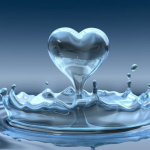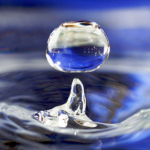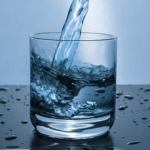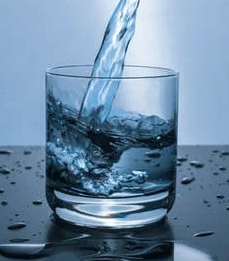Welcome back! Last week, we talked about caring for the caregiver. If you missed that blog and would like to catch up, click HERE.

This week, we are going to talk about something that we all need to survive. Water. Some people love nothing more than a cool drink of water, and others won’t allow it to pass by their lips. Others, still, claim they “feel sick” after drinking water. They may be on to something. Let’s chat…
The USGS explains how our body is made up and what water can do for us:
“Up to 60% of the human adult body is water. According to H.H. Mitchell, Journal of Biological Chemistry 158, the brain and heart are composed of 73% water, and the lungs are about 83% water. The skin contains 64% water, muscles and kidneys are 79%, and even the bones are watery: 31%“.
Wow! Those are high percentages, aren’t they?
So how much should we be drinking every day?
An adult male needs about 3 liters (3.2 quarts) per day while an adult female needs about 2.2 liters (2.3 quarts) per day. The amount of water a person requires does not have to come from drinking liquids, as some of this water is contained in the food we eat. Translation: We need to drink a little over 8 water bottles (12 ounces each) per day.
We’ve established the importance of drinking water, but now let’s talk about those who literally can’t stand to drink it and, in fact, feel better if they drink something with sugar in it, like soda or orange juice.

The Center for Young Women’s Health has this to say about that:
“There are a couple of reasons why you may be feeling nauseous after drinking water. If you only drink after eating a meal, you may experience some nausea because you may be uncomfortably full. On the other hand, if you only drink on an empty stomach, you may experience nausea due to the fact that your body is low on energy and hungry for food! This may explain why juice or soda feels okay to drink because those liquids contain sugar that your body can use for energy. However, plain water is very important, and the high amount of sugar found in juice and soda is not beneficial for our health over time. Another reason why you might feel queasy is if you drink too fast when you are dehydrated and feeling very thirsty.
“Therefore, some helpful tips are: 1) try drinking small sips of water while you eat and throughout the day instead of trying to gulp back an entire glass and 2) add a splash of juice or fruit to your water to add some flavor, which might help make it easier to drink. If you continue to feel nauseous when drinking water, talk to your health care provider.“
According to Susan E. Brown, Ph.D., cold foods and beverages slow down the rate of digestion because they must be “heated up” before proper digestion can take place. Cold beverages are removed from the stomach more quickly. Those at room temperature stay in the stomach longer. That is why marathon runners try to hyper hydrate and drink cold water before a race — to prevent from becoming dehydrated. Yet, if cold liquids move through at a fast rate, they do not aid digestion.
The Food Enzyme Institute suggests that water isn’t what’s making you ill, but lack of chewing. “Digestion begins in the mouth. When you chew your food it is mixed with saliva, which not only supplies moisture but also the carbohydrate-digesting enzyme, amylase. When you eat raw food, its enzymes work with the salivary amylase to begin digestion.

“Swallowing prevents food from remaining in the mouth long enough for any significant amount of digestion to occur. However, the food and salivary enzymes continue the digestion process until the secretion of stomach acid causes the pH to drop below 3.0, which is the activity range of plant enzymes. Before the food arrives, the stomach normally has a pH between 5.0 and 6.0. In young and healthy adults it takes about 45 minutes before enough acid is generated to drop the pH to 3.0. This is because stomach acid is secreted into the stomach in response to the expansion of the stomach wall. During this time a considerable amount of digestive work can be accomplished if plant enzymes, either indigenous to the raw food ingested or from a supplemental source, are present. Unfortunately, the amount of time necessary to make stomach acid increases with age. Studies have proven that older adults often suffer from inadequate stomach acid levels”.
So there you have it. When people say drinking water makes them feel sick, there are several reasons this may be happening. Water is so very important to our bodies. Staying hydrated helps circulation by improving blood flow throughout the body. Warm water is particularly beneficial as it encourages the veins to expand, thus allowing more room for blood to flow. Have you ever been in the middle of a blood draw, and they are having a hard time finding a vein? They often will ask, “did you drink any water today?”. Now we know why.
So how do I know if I’m dehydrated? Here are some tips:

- You have a headache. Instead of reaching for painkillers the next time you have a headache, try drinking some warm water. This will expand your veins and possibly end your headache.
- Your mouth, eyes, and skin are dry. Your body needs water to lubricate your mouth, hydrate your skin, and help you see clearly.
- Your urine is dark. The color of your urine is probably the most visible sign and common indicator of whether you’re properly hydrated or over-hydrated. If you notice your urine is more concentrated or darker, it means it has more waste and this is a sign you should drink some water as soon as possible.
- You’re disoriented. Dizziness, confusion, difficulty concentrating, and delirium are all signs you need to drink some water.
- Your energy level is low. When you’re dehydrated, the body stores up energy by decreasing blood circulation. Blood circulation is important because it delivers oxygen to the muscles, and if our blood flow isn’t circulating properly, we become lethargic and our energy level decreases.
- You often have muscle cramps or spasms. When we sweat, as in during vigorous exercise, it can lead to a drop in sodium levels. If our muscles don’t have enough water and sodium, they become extremely sensitive, causing involuntary muscle contractions or spasms.
- You don’t sweat during exercise. If there isn’t enough water to produce sweat, our body can’t regulate itself, which could be very dangerous as it may lead to overheating or heat stroke.
- You’re always hungry. Dehydration slows down our metabolism. This in turn can have an adverse effect on the body’s ability to burn fat. Our brain may also confuse thirst with appetite. When you find yourself wanting to snack, try drinking some water first.
Well, I don’t know about you, but I learned a lot about my body’s relationship with water in researching for this blog! I will definitely be drinking more water in the future.
Editors note: This blog is not a replacement for sound medical advice, and many diseases, disorders, and syndromes have symptoms that overlap. Only a qualified medical professional can diagnose you. That said, if you think this blog may be helpful to others, please hit the Facebook Icon and share it on your personal pages. Thank you for reading us, we really do appreciate you!

I used to feel nauseous if I tried to drink a full glass of water at regular intervals to get it done.
Once I got a 24oz tumbler and packed it everywhere all the time I would have 60 oz in before the end of the day easily. Great way to keep from snacking too as you’re not as hungry.
Reposted from Canby Now
Lucy Wendy
Thank you for covering this topic … I’m going to try warm water today!
Reposted from Canby Now
Cher Rol
My husband even listened to me reading this! Thank you, Linda.
Reposted from Canby Now
Sara Cambreleng
Linda Tate I look always forward to your posts
Nice summary! And yes I feel the nauseated feeling too, particularly when catching up with my water intake by downing a bottle of water.
Great explanation. I always feel nauseous after drinking plain water but can drink flavored with no trouble.
Reposted from Canby Now:
Hannah Elise
Great read, thank you!